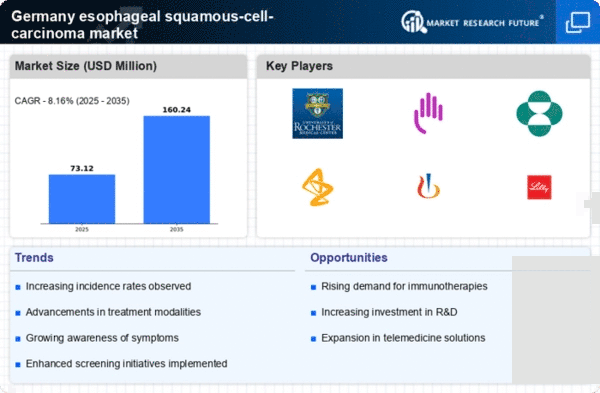Rising Healthcare Expenditure
The increasing healthcare expenditure in Germany is a notable driver for the esophageal squamous-cell-carcinoma market. In 2025, healthcare spending is projected to reach €500 billion, reflecting a commitment to improving cancer care. This financial commitment enables better access to advanced treatment options, including surgery, chemotherapy, and radiotherapy. As healthcare budgets expand, hospitals and clinics are likely to invest in state-of-the-art equipment and training for healthcare professionals. This investment is essential for enhancing treatment outcomes and patient experiences. Furthermore, the German government is actively promoting initiatives aimed at improving cancer care, which may lead to increased funding for research and patient support programs. Consequently, the rising healthcare expenditure is expected to positively influence the esophageal squamous-cell-carcinoma market, facilitating access to innovative therapies and comprehensive care.
Increasing Diagnostic Capabilities
The esophageal squamous-cell-carcinoma market in Germany is experiencing growth due to advancements in diagnostic technologies. Enhanced imaging techniques, such as endoscopic ultrasound and advanced biopsy methods, have improved early detection rates. This is crucial, as early-stage diagnosis significantly increases survival rates. In 2023, approximately 60% of cases were diagnosed at an early stage, compared to 45% in previous years. The ability to identify this cancer type earlier allows for timely intervention, which is vital in improving patient outcomes. Furthermore, the integration of artificial intelligence in pathology is expected to streamline diagnostic processes, potentially increasing the accuracy of diagnoses. As awareness of these technologies grows, the demand for diagnostic services in the esophageal squamous-cell-carcinoma market is likely to rise, driving market expansion in Germany.
Patient Advocacy and Support Groups
Patient advocacy and support groups play a crucial role in the esophageal squamous-cell-carcinoma market in Germany. These organizations raise awareness about the disease, provide educational resources, and support patients and their families. Their efforts contribute to increased public knowledge regarding symptoms and the importance of early detection. In 2025, it is estimated that advocacy groups will reach over 100,000 individuals through various outreach programs. This heightened awareness may lead to earlier diagnoses and increased demand for treatment options. Additionally, these groups often collaborate with healthcare providers to improve patient care standards and promote research initiatives. The influence of patient advocacy is likely to drive engagement in clinical trials, further propelling advancements in treatment options within the esophageal squamous-cell-carcinoma market.
Growing Investment in Research and Development
Investment in research and development (R&D) is a significant driver for the esophageal squamous-cell-carcinoma market in Germany. Pharmaceutical companies and research institutions are increasingly focusing on innovative therapies and treatment options. In 2024, R&D spending in oncology reached €1.5 billion, with a substantial portion allocated to esophageal cancers. This investment is likely to lead to the discovery of novel therapeutic agents and improved treatment protocols. Additionally, collaborations between academic institutions and industry players are fostering an environment conducive to innovation. The potential for breakthroughs in targeted therapies and immunotherapies could reshape treatment paradigms, enhancing the overall efficacy of interventions in the esophageal squamous-cell-carcinoma market. As new therapies emerge, they may significantly impact patient survival rates and quality of life.
Technological Advancements in Treatment Delivery
Technological advancements in treatment delivery systems are significantly impacting the esophageal squamous-cell-carcinoma market in Germany. Innovations such as targeted drug delivery systems and minimally invasive surgical techniques are enhancing treatment efficacy while reducing recovery times. For instance, the adoption of robotic-assisted surgeries has increased by 30% in recent years, allowing for more precise interventions. These advancements not only improve patient outcomes but also reduce healthcare costs associated with prolonged hospital stays. Furthermore, the integration of telemedicine in oncology is facilitating remote consultations and follow-ups, making care more accessible for patients. As these technologies continue to evolve, they are likely to reshape treatment landscapes, driving growth in the esophageal squamous-cell-carcinoma market and improving overall patient experiences.
















